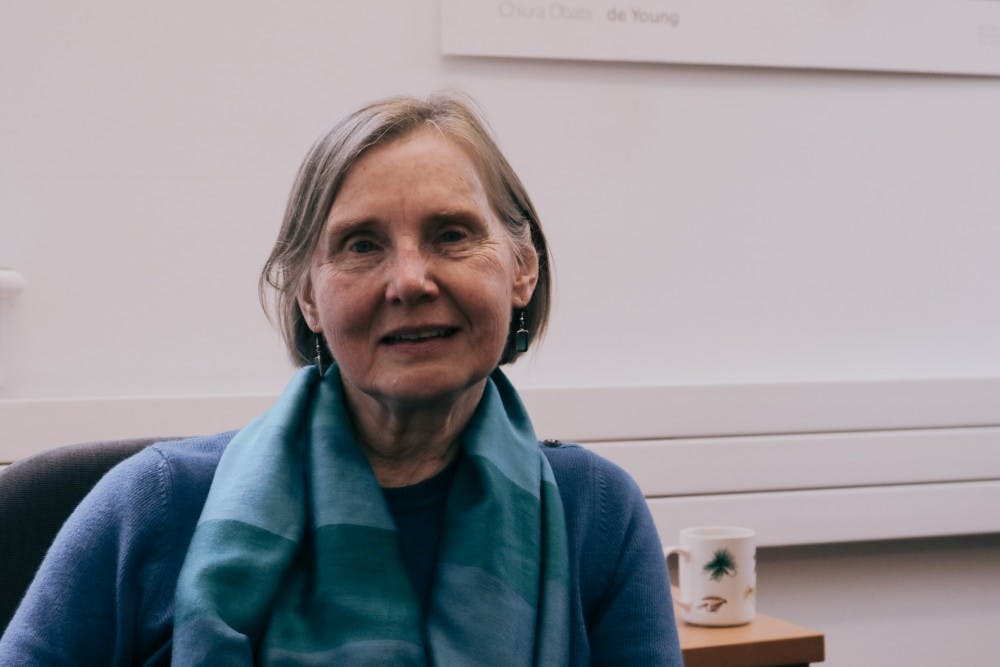Maybe it’s because I’m thinking about becoming an English major that I’m so entranced when Professor Deborah Burnham speaks. Maybe it’s because I already love writing. But I have the feeling that Burnham could talk to anyone and get them to love books just as much as she does, which—by the way—is a lot.
When I first meet Burnham, we get to talking about the class she’s teaching next semester, ”Orphans Making Good: 19th–Century British Literature,” which focuses on novels with an orphan protagonist. She immediately explodes into conversation about the books she can’t wait to teach.
“Great Expectations,” she begins. “It starts out in a graveyard, and a little boy is looking around and thinking, ‘Where are my parents?’ He’s looking for his parents’ gravestones. And all of a sudden, somebody who turns out to be a criminal picks him up.”
Burnham mimics the face of the small, scared boy, holding up her left hand to demonstrate how the criminal would have yanked him up by the collar.
Going from book to book, she takes me on a journey through the lives of characters who feel as real as the people she knows and loves outside of novels—Charlotte Brontë’s Jane Eyre, George Eliot’s Dorothea, and Lewis Carroll’s Alice. Occasionally, as she’s gushing about a novel, she’ll preface its ending with a “spoiler alert”—which I find incredibly charming, considering that the book was probably published centuries ago.
Having been a graduate student and a professor at Penn English for 45 years, Burnham lives and breathes literature. For her, what makes writing so powerful is that it can have “resonance” for different people in different ways. A poet and fiction writer, Burnham feels motivated to write because she can connect with others who may have had similar experiences or introduce a completely new experience to someone else.
And Burnham is all about fostering that understanding—that resonance—in her students, which starts with access. In the last forty–something years, she has seen Penn English transform from a group of professors who only taught staples like Old English or 19th Century American Literature to a dynamic team giving students the opportunity to study graphic novels, Latinx poetry, queer literature, Italian films, and so on. Burnham herself grew from teaching strictly poetry to feeling passionate about all kinds of writing, especially large novels.
“There’s so much less of a box,” she says, which allows people of all backgrounds to see themselves in what they’re reading for class.
She’s also passionate about building enthusiasm for literature in young people, which is part of why she decided to write a novel.
“The thing about being a young reader is that you plow through books pretty fast,” she says. “Somebody might have taken you to the library when you were a kid, and you came back with five books. And seven days later you finished them.”
To feed this “enormous appetite” that kids have for reading, Burnham is working on a book about a young woman working in a draft resistance office during the Vietnam War. As she describes her protagonist, her words and gestures bring the character to life: over the course of the novel, the young girl becomes entangled in her politically complicated job, family drama involving a very odd aunt, and a quiet but sweet love story.
Burnham dedicates her time to teaching others besides Penn students through the workshop, "Writing a Life." The goal of the course is to allow people people formerly or currently diagnosed with cancer to freely write about their experiences. They were looking for people to assist with workshops and, at times, physically help the students write. She joined and agreed to help in any way she could. After the founder left the group, Burnham began leading the sessions, which now occur around twice a month at the Kelly Writers House and the Perelman Center for Advanced Medicine.
At each session, Burnham picks a prompt from poetry, fiction, or memoir, often written by someone who has or has had cancer. The participants then work individually before coming together at the end to share their work. Unlike in her regular teaching job, Burnham stresses to these students that “this is not school.”
“Spelling doesn’t count,” she says. “This is not an assignment; it’s an invitation. You can write anything you want.”
In that group, cancer patients and survivors get a non–judgmental space to document their experiences and relate to others in similar situations, a sentiment that goes back to Burnham’s own motivations for writing.
“Why do I write?” she says. “Because it’s fun. Because it makes me feel better. Because I’m really interested in exploring my own experience verbally and seeing if it has resonance in other places.”
“Plus,” she says enthusiastically, “I just love writing.”







